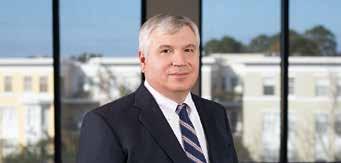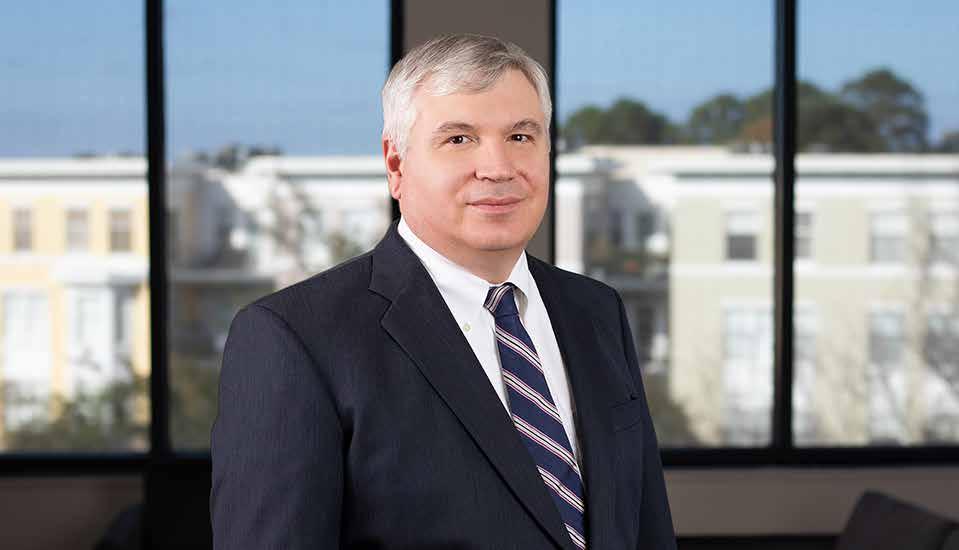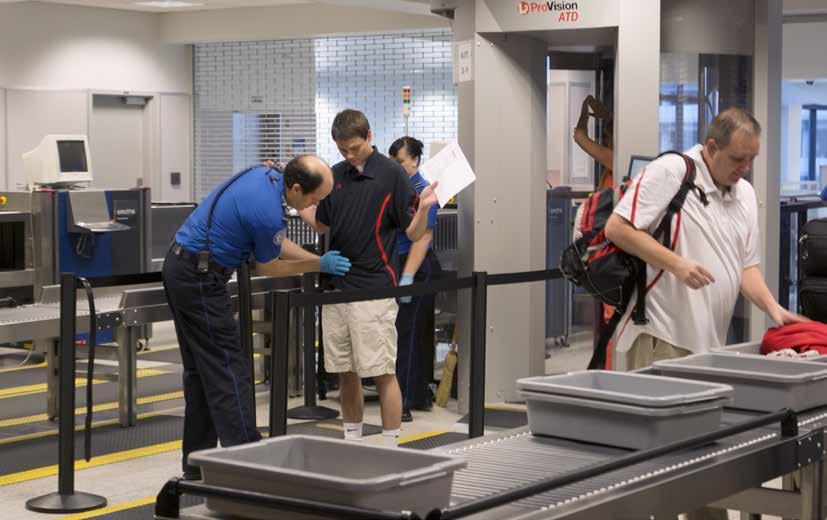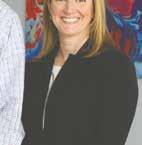

VOLUME 21 NUMBER 2 WEEKLY IN DIGITAL. IN PRINT. IN PERSON. Expertly Focused On Today’s Legal Professional. February 2023 | $8.50 | sclawyersweekly.com OF LAW AND BUSINESS Shumaker managing partner D.G. Diminich talks about balancing his life’s passions and guiding the firm’s growth PAGE 8 5 QUESTIONS WITH Charleston
Cunningham
the school’s historic success PAGE 10 BEHIND THE DEAL What led to Carolinas-based Nexsen Pruet joining Alabama firm PAGE 5
School of Law dean Larry
discusses









THERE’S STRENGTH IN NUMBERS. Looking for Co-Counsel? yarboroughapplegate.com | 843.972.0150 $23 MILLION Tractor-Trailer Crash $28.5 MILLION Medical Malpractice $15.7 MILLION Sca old Fall Injury $20 MILLION Worker Death at Concrete Plant $13.1 MILLION Road Defect and TBI $11.7 MILLION Insurance Bad Faith $10 MILLION UTV Rollover $10 MILLION Insurance Bad Faith RECENT VERDICTS AND SETTLEMENTS IN 2022: $26 MILLION PAID IN CO-COUNSEL FEES EVERY CASE IS UNIQUE AND PRIOR RESULTS DO NO GUARANTEE FUTURE OUTCOMES
IN PRINT. IN DIGITAL. IN PERSON. Expertly Focused On Today’s Legal Professional.
130 North McDowell Street, Unit B, Charlotte, NC 28204 (704) 377-6221 • FAX(704) 377-4258
E-mail: service@bridgetowermedia.com • Circulation: 1-877-615-9536
Executive Vice President of Media and Senior Group Publisher Liz Irwin, lirwin@bridgetowermedia.com
n EDITORIAL
Interim Editor
Jason Thomas jthomas@scbiznews.com Reporter
Haviland Stewart hstewart@nclawyersweekly.com
Digital Media Manager
Scott Baughman sbaughman@mecktimes.com
n CIRCULATION
Audience Development Manager
Disa Ehrler
dehrler@bridgetowermedia.com
Circulation 1-877-615-9536 service@bridgetowermedia.com
CONTENTS
COVER STORY: MUSIC AND MERGERS
p5 | A friendship forged by love of music leads to Carolina-based Nexsen Pruet joining Alabama firm
LETTER FROM THE EDITOR
p3 | You talked. We listened.
n ADVERTISING
Advertising Account Executive
Sheila Batie-Jones sbatie-jones@sclawyersweekly.com
n ACCOUNTING & ADMINISTRATIVE Business Manager
Michael McArthur mmcarthur@bridgetowermedia.com
n ART & PRODUCTION
Creative Director
Melanie Bingham Project Management
Jordan Mazuranic Production Specialist John Reno Director of Production Services
Bradley Redmond
WWW. SCLAWYERSWEEKLY.COM
SCLAWYERSWEEKLY
South Carolina Lawyers Weekly (USPS #020216) is published Monthly with General Statewide Circulation by South Carolina Lawyers Weekly at 130 N. McDowell St. Unit B, Charlotte NC 282042411. (919) 829-9333, (800)-876-5297.
Periodicals postage paid at Charlotte, North Carolina 28228-9998.
POSTMASTER - Electronic Service
Requested. send address changes
to South Carolina Lawyers Weekly, Subscription Services, P.O. Box 1051 Williamsport, PA, 17703-9940
To place orders, temporarily stop service, change your address or inquire about billing: Phone: (877) 615-9536
Email: service@bridgetowermedia.com
To submit subscription payments, mail: Subscription Services P.O. Box 1051 Williamsport PA 17703-9940
©2023 BridgeTower Media. Material published in South Carolina Lawyers Weekly is compiled at substantial expense and is for the sole and exclusive use of purchasers and subscribers. The material may not be republished, resold, recorded, or used in any manner, in whole or in part, without the publisher’s explicit consent. Any infringement will be subject to legal redress.
BridgeTower OpCo, LLC d/b/a North Carolina Lawyers Weekly Media is an equal opportunity employer.
FEATURE
p8 | OF LAW AND BUSINESS: Shumaker manager partner G.P. Diminich on combining his life interests
5 QUESTIONS WITH p10 | Larry Cunningham, provost, dean, and professor of law at Charleston School of Law, on the school’s success

COURTS p12 | 4th Circuit: No implied right to record TSA agents
OPINIONS
p14 | Highlights of noteworthy cases at state courts

POWER LIST PERSONAL INJURY
p18 | Meet difference makers in the field of personal injury
VERDICTS & SETTLEMENTS
p21 | The latest results on South Carolina legal cases
LAWYERS IN THE NEWS
p24 | A roundup of personnel news at South Carolina firms
SOUTH CAROLINA LAWYERS WEEKLY | FEBRUARY 2023 3
Voicing an opinion about opinions
You’ve spoken, and we’ve listened. In this second issue of the reimagined South Carolina Lawyers Weekly, you’ll notice two pages of opinion digests. You’ll also notice a note about finding the full list of digests online.
This came about after hearing from you, our readers. By far the biggest concern you had with the redesign was the lack of opinion digests. This was something that we thought about a great deal prior to the relaunch.
Unfortunately, with us moving to a monthly print schedule, it would be impossible to include the full list of digests in the print edition. Which is why we will select some noteworthy opinions to be included in each issue. Please be assured that all digests will always be available online at sclawyersweekly.com.

Speaking of Version 2.0, in this edition’s cover story you’ll find reporter Haviland Stewart’s look at the merger between Carolinas-based Nexsen Pruet joining an Alabama firm to create a nationwide practice. The roots of the deal might have you tapping your toes.
You’ll also read a profile on G.P. Diminich, managing partner at Shumaker, who is leading the firm’s growth in Charleston, as well as a 4th U.S. Circuit Cort of Appeals

case involving First and Fourth Amendment rights. And be sure to check out the 5 Questions With chat with Larry Cunningham, provost, dean, and professor of law at Charleston School of Law, about the school’s success. You’ll also find Verdicts and Settlements inside and a roundup of personnel moves from firms across the state.
That several of you reached out about the redesign reaffirmed my belief in the importance of South Carolina Lawyers Weekly, and what it means to you.
I look forward to making it better with each edition.
Jason Thomas is the interim editor of South Carolina Lawyers Weekly. Reach him via email at jthomas@scbiznews.com.
4 FEBRUARY 2023 | SOUTH CAROLINA LAWYERS WEEKLY NEWS LETTER FROM THE EDITOR
Start your research with South Carolina Lawyers Weekly. Explore our archives of stories and case digests to find that decision you remember. Get copies of the full-text opinions you need. Research verdicts and settlements to compare what your case is worth or to see what experts have been used. It’s all part of your subscription. Explore our online resources today! sclawyersweekly.com/subscribe
MUSIC AND MERGERS

At the first strum of the ear-splitting electric guitar, Cannery Hall erupted with life. Leighton Lord maneuvered through the sea of fans, inching closer to the stage as Jason and the Scorchers mesmerized all of Nashville. As the beat pulsed through him, Lord spotted a familiar face intermittently illuminated by the strobe lights – a classmate he knew as Jeff Grantham.
It was 1986, and Lord and Grantham, who were both newly enrolled at Vanderbilt Law School, immediately bonded over their love for music. For the remainder of their academic careers, the two remained close friends. When they grew tired of
studying, they marched out of the law school library and headed for the nearest music venue.
Prior to graduating and moving to different states to begin their law careers in 1989 they soaked up all the music they could, seeing iconic groups including Guadalcanal Diary, John Hiatt, REM, Love Tractor, and The Grateful Dead live in concert.
Little did they know that nearly 33 years later, the two executives would lead the merger of two law firms to create a practice that would have 23 offices coast-to-coast.
In 2018, after almost 30 years of limited contact, Lord picked up the phone to congratulate Grantham on
being elected managing shareholder of Maynard Cooper & Gale.
For the next two years they sporadically sought each other’s counsel regarding firm maters. In 2020 when the onset of COVID-19 swept uncertainty across the nation, they turned to each other once again.
“When COVID hit, Jeff and I really started talking a lot,” Lord said.
“‘What are you doing? Are you closing down your offices? What’s your mask policy?’ all those kinds of things. We started this dialogue, really about helping each other become good managing partners, and then through
SOUTH CAROLINA LAWYERS WEEKLY | FEBRUARY 2023 5
COVERNEWSSTORY
See Page 6
A friendship forged by love of music leads to Carolina-based Nexsen Pruet joining Alabama firm
B y H aviland S tewart • hstewart @ nclawyersweekly . com
Continued From Page 5
that dialogue, we started to become very fond of each other’s law firms.”
Nearly five years after the rekindling of their friendship, they announced a major merger between their two law firms.
On Jan. 5, 2023, Alabama-based Maynard Cooper & Gale, and Carolinas-based Nexsen Pruet announced that they would be merging, operating under the name Maynard Nexsen effective April 1, 2023.
“We didn’t go into this conversation like, ‘hey, let’s merge,’” Grantham said. “It was just interactions that got to the point where we realized, ‘gosh, our firms seem very compatible.’”
According to Lord and Grantham, the initial idea of the merger was sparked by discovering the congruency of each firm’s culture and client-centric focus.
“We weren’t going to do anything like this if it sacrificed the culture that we think is very important to being successful,” Lord said. “By finding a firm like Maynard, where we felt like we had a shared culture, and we
could create a better firm. That’s why our partners were unanimous in saying, ‘let’s do this,’ it was the culture.”
As a combined firm, Maynard Nexsen will bring together more than 550 lawyers operating out of 23 offices across the United States.
The Maynard Nexsen leadership team combines staff from both original firms. Grantham, managing shareholder of Maynard Cooper & Gale, will serve as CEO and managing share-
holder of Maynard Nexsen. Lord, chairman of Nexsen Pruet, will serve as president and chief strategy offi-


Birmingham
Huntsville Mobile
Montgomery CALIFORNIA
Los Angeles
Charlotte
Greensboro
Raleigh
Charleston
Columbia
Greenville
Hilton Head/Bluffton
Austin
cer of the combined firm. Greg Curran, chairman of Maynard Cooper & Gale, will serve as chairman of the board and head of client relations for Maynard Nexsen.
The original Maynard Cooper & Gale was the larger of the firms, with 350 attorneys operating out of 15 offices nationally. While Nexsen Pruet was one of the largest firms in the Carolinas, it was the smaller of the two companies, with 200 attorneys working out of eight offices, primarily in the Carolinas.
Both firms had more of a presence in the South, however, they only had one location overlap in their entire footprint. This gives Maynard Nexsen a strong platform for major geographical reach without the inefficiencies of operating multiple offices out of the same city.
According to the Lord, is a priority to the leadership team to pull strengths from each original firm to adopt to Maynard Nexsen.
“At the very beginning and we said, ‘We’re going to create a new law firm, and the new law firm is going to be
See Page 7
6 FEBRUARY 2023 | SOUTH CAROLINA LAWYERS WEEKLY
COVERNEWSSTORY
Locations ALABAMA
San Francisco FLORIDA Miami Orlando GEORGIA Atlanta IOWA Des Moines NEW YORK New York
NORTH CAROLINA
SOUTH CAROLINA
Myrtle Beach TENNESSEE
Nashville TEXAS
Dallas WASHINGTON D.C. 23 OFFICES FROM COAST TO COAST
Leighton Lord
Jeff Grantham
better than its constituent parts,’” Lord said. “That’s been one of the extremely unique things about this process.”
For the past few months, the leadership team for Maynard Nexsen has been assessing which areas each firm is excelling in, to ensure the best practices are applied to the new firm.
“Maynard has developed a great public securities practice, a great cyber practice, and a great governmental contracts practice, which are three things that the Carolinas really need more of,” Lord said. “Because we have such deep Carolina roots, we can help give Carolina-based companies those services now.”

The Maynard Nexsen team is excited to be able to offer their clients additional capabilities, expertise and geological reach after this merger goes into effect. According to Lord and Grantham, after the initial launch
of the new firm, Maynard Nexsen plans to grow within its established footprint, rooting itself in growing markets including Charlotte and Austin. They are confident that the uniqueness of their firm will be attractive to clients and want to be able to provide legal service to all who need it.
A friendship that was forged by a mutual love of music will soon take
center stage with the leadership of a newly created law firm with a national scope.




“Although we will have a heavily dominated presence in the Southeast, from the Carolinas through to Alabama, we are a national firm, and we are focused on that,” Grantham said. “We’re going to certainly go where the clients need us.”

SOUTH CAROLINA LAWYERS WEEKLY | FEBRUARY 2023 7
At the very beginning and we said, ‘We’re going to create a new law firm, and the new law firm is going to be better than its constituent parts.’ That’s been one of the extremely unique things about this process.
Continued From Page 6 COVERNEWSSTORY Take the first step today toward building equity in your brand, promoting your excellence and offering your audience more reasons to trust you. Contact EVG, and a member of EVG’s content licensing team will be happy to answer your questions and get you started. You’ve Earned it. EnVeritas Group: creative licensing solutions for professionals that earn accolades they deserve enveritasgroup.com B Enveritas is the exclusive reprints and logo licensing partner for North Carolina Lawyers Weekly----------------------------In a first, COVID-19 concerns lead to compassionate release for inmate 2020 Evan Meyer Slavitt Greenville EvanMeyerSlavittbelieveslawyers values of the profession and the next generation of lawyers that will “Being leader more than just an operational job. requires strong ethical and teaching component,” he Slavitt grew up on Cape Cod in Massachusetts and enjoyed participating in the Harwich Junior Theatre, an organization that relied on participating children to act, build the sets, run lighting and sound, work on think this approach was essential to my later academic and professional success,” he says. “Further, got chance to fly on stage as John in Peter Pan and to play Templeton the Rat in editoroftheHarvardLawReview.Heis senior vice president, general counsel, and corporate secretary at AVX Corporation, global manufacturing facility in Greenville. important mentor who taught him trial lawyer. “Bob was partner in law firm the stress of private practice.” If Slavitt had not become lawyer, he likely would have pursued career both intellectually challenging and His first job at bakery, which required him go to work at a.m. every day, taught him to find joy in his “The lead baker was always there when arrived, and had been for some time,” Slavitt says. “He never complained because he loved what he did and showed me the important finding work that you love, because that diminishes all the ancillary get done because taking my kids to the park was more important.” When Slavitt takes vacation, he enjoys visiting islands in the Caribbean where his cell phone doesn’t work, and where he can simply sit on the beach with fruity beverage. Some people may not know that Slavitt likes to relax by doing needlepoint, and he has A now Promote it!
- Leighton Lord
OF LAW AND BUSINESS
Shumaker managing partner G.P. Diminich finds a way to combine his two great life interests
As G.P. Diminich sat staring out the window of his Davidson dorm room, a life-changing decision loomed overhead: “should I study business or law?”
Unable to pick one passion and let the other go, Diminich made a decision.
He would do both.
Over three decades later, Diminich, who is now a highly recognized tax law attorney in South Carolina, stands by that choice.
For the past five years, Diminich has acted as managing partner and
wealth strategies regional service line leader at Shumaker, Loop & Kendrick’s Law Firm’s in Charleston. Through the practice of tax law, mergers and acquisitions, corporate law, partnership law, wills, trusts, probate, estate planning, tax-exempt organizations, state and local taxation, business litigation, and probate litigation, Diminich has found a way to combine his interests while providing expert advice to clients.

At a young age Diminich discovered his interests in both law and business. Although he hadn’t quite figured out how he was going to combine his pas-
sions into a career, he recognized the importance of creating a life he enjoyed.
Diminich was born in Queens, New York, in 1973 to European immigrants who had come to the U.S. just a few years prior. Diminich’s mother came to New York from Italy with her family as a teenager. A few years later, when her family decided to return to Italy, she stayed. Shortly after, she met Diminich’s father, an immigrant from Croatia who was seeking asylum in the U.S.
See Page 9
8 FEBRUARY 2023 | SOUTH CAROLINA LAWYERS WEEKLY
FEATURE
B y H aviland S tewart • hstewart @ nclawyersweekly com
G.P. Diminich has found a way to balance his life’s passions. Photo/Provided
Continued From Page 8
When Diminich was 5 years old, his family moved from Queens to the D.C. area, where he lived until beginning college in North Carolina.
Diminich graduated from Davidson College with a bachelor’s degree in history and economics, before attending the University of South Carolina School of Business and School of Law, where he got his master’s in international finance (Italian), and his J.D. in business, tax, and estate planning and administration. After graduating from University of South Carolina, Diminich also attended New York University School of Law to get his LL.M. in Taxation.
Since transitioning out of higher education and into his career in the early 2000s, Diminich has had great success, providing what he likes to call “4D advice” to his clients.
“Everything revolves around finance and tax,” Diminich said. “Ultimately, clients can’t make decisions without knowing all the tax ramifications of what they do. I was passionate about tax, because it was a way to provide value to clients in a way that is demonstrable.”
With his background in both law and finance, Diminich has been able to provide legal advice to small business owners and high net-worth individuals in a more holistic way, with the unique ability to guide clients through legal events.
While Diminich has had great success in his career, it has not always been easy. Something that his education had not prepared him for was the way that understanding psychology and communication play into his role as an attorney.
“I always joke that part of being an estate planning attorney and a wealth planning attorney is being a part time armchair psychologist,” Diminich said. “You’ve got to be able to read a situation and determine the course of action and how to relate to people. To have a good dialogue and a good level
of transparency and trust is difficult.”
Through Diminich’s career working in estate planning and wealth planning, he has advised clients during some of their hardest moments. While navigating them through the fine details of legal logistics in the face of tragedy, Diminich works to ensure that their businesses and assets are preserved, protected, and able to continue to grow.
“Life can change at a moment’s notice,” Diminich said. “We’ve all been through that sadly. But when you’ve got a business, it’s something that you’ve got to consider and have a succession plan in place. Otherwise, it really becomes difficult when a tragic situation arises.”
While challenging, Diminich considers helping people through crisis by taking on financial and legal logistics to be the most fulfilling aspect of his career.
“I admire their courage and their internal strength to push through stuff of sometimes incredible tragedy,” Diminich said. “That is a situation where folks need to have the clarity of insight, because whatever decisions they make at that moment are going to have ramifications or years down the road.”
Despite completing his extensive education years ago, Diminich has made it a priority to continue learning and adapting his legal education to the ever-changing world. He is a certified specialist in taxation law and a certified specialist in estate planning and probate law, distinctions given by the Supreme Court of South Carolina. Diminich has also been appointed to the Supreme Court of South Carolina Commission on Continued Legal Education and Specialization, where he advocates for the importance on attorneys keeping up to date on their legal education.
Diminich has also been elected as a Fellow of the American College of Trust and Estate Counsel, a Fellow of the American College of Tax Counsel, and a Fellow of the American Bar
Foundation.
While making waves in the South Carolina law community, Diminich has practiced at several firms, including Buist Moore Smythe McGee, Clawson & Staubes, and Smith Moore
Leatherwood. Since 2018, Diminich has been with Shumaker as a managing partner, and is now helping to lead the expansion of their Charleston office.
Since entering the Charleston market in 2018, Shumaker has nearly tripled the number of attorneys and is currently expanding its office space by over 8,000 square feet. While this is a common theme across the Carolinas, Charleston’s ranking as one of the fastest-growing cities in America and the subsequent rising demand for business legal services has provided Shumaker with a booming market to grow in.
However, according to Diminich, the market isn’t the only thing contributing to Shumaker’s success, attributing much of it to the firm culture of collaboration and goal of serving the community.
“We foster a culture where we try to pick the right people,” Diminich said. “Those who are collaborative, appreciate teamwork, and who work together to get to serve the client’s best interest. One thing I encourage all attorneys to do is serve the community. When you’re serving your community, you’re serving your clients. It’s the same passion, and the same thing when working collaboratively with other folks to get to the best result.”
Moving forward, Diminich wants to expand on all of his prior accomplishments to help create a firm that is able to serve clients holistically, guiding them through legal matters with knowledge and empathy.
“Whether it is in this office, or referring them to another office within the firm, I want the advice they get to be the best advice,” Diminich said. “Not only from a legal perspective, but also advice that’s considers a lot of their personal needs and desires.”
SOUTH CAROLINA LAWYERS WEEKLY | FEBRUARY 2023 9
FEATURE
QUESTIONS WITH...
Larry Cunningham
Larry Cunningham is a provost, dean, and professor of law at Charleston School of Law. Cunningham brings a wealth of experience in both teaching and practicing law to this position and has led Charleston Law students to unprecedented success.
According to a news release from Charleston Law, the Office of Bar Admissions of the Supreme Court of South Carolina reported that Charleston School of Law recorded a 77% first-time bar pass rate for the July 2022 bar exam. This was Charleston Law’s highest first-time rate since 2013 and the school’s best since South Carolina first administered the Uniform Bar Exam in February 2017.
Prior to coming to Charleston Law in 2020, Cunningham held multiple titles at St. John’s University School of Law, including professor of legal writing, associate dean for Student Services, associate academic dean, vice dean, and associate dean for Assessment and Institutional Effectiveness.
Before making the switch into teaching law, Cunningham practiced as a Judicial Law Clerk for the U.S. District Court. Later, he was an assistant commonwealth’s attorney for the Alexandria Commonwealth Attorney’s Office. Cunningham last practiced law as assistant district attorney in the Appeals Bureau of the Bronx District Attorney’s Office until 2008 when he began teaching law at St. John’s
University School of Law.
In the following Q&A, Cunningham chats with South Carolina Lawyers Weekly about Charleston Law students’ success on the July 2022 bar exam, his switch from practicing law to teaching law, and what entering the workforce looks like for recent law school graduates.

Q: What is the mood of graduates entering a shaky workforce with many law firms scaling back after a COVID-related hiring spree?
A: When our students graduate, they head into diverse practices, ranging from large to small firms, government agencies, corporations, public interest organizations, and judicial clerkships. As a result, the employment of our graduates is not as sensitive to fluctuations in particular segments of the employment market. South Carolina’s economy continues to boom, and, as a result, legal hiring in this state is particularly robust.
We help prepare students to secure employment by being proactive. Every student completes a program in the first semester in which they are taught how to write a resume and cover letter, how to interview, and ways to find a job. Students are then assigned a career counselor who works with them on an individualized strategy for achieving their goals. Students supplement their
traditional classroom experiences with externships (from which they can pick from over 150 sites) and five clinics.
Q: The Office of Bar Admissions of the Supreme Court of South Carolina reported Charleston School of Law recorded a 77% first-time pass rate for the July 2022 bar exam. What are some of the main factors you attribute Charleston Law’s students’ success to?
A: Graduates’ success on the bar exam is attributable, first and foremost, to the hard work that they put into this difficult standardized exam. We cannot take the bar exam for them. That said, we help them every step of the way. Our curriculum is rigorous. We have many required courses, all in the fundamentals that are tested on the bar exam. There is no fluff in our curriculum. And our curriculum is taught by expert faculty — professors who are not only extremely knowledgeable about the law but how to teach it to students. Our faculty are incredibly dedicated to students’ success. During the bar preparation period, it is not uncommon for faculty (myself included) to be texting late into the night with graduates answering their questions.
We also have a dedicated Office of Academic and Bar Success that helps students from orientation through the
10 FEBRUARY 2023 | SOUTH CAROLINA LAWYERS WEEKLY
1 2 FEATURE
5
bar exam. They teach students how to learn and how to approach the bar exam. We also partner with BarBri to provide a fully paid-for commercial bar prep course to every student upon graduation. Our partnership with BarBri also gives students and faculty access to resources throughout the curriculum. Lastly, we have made a concerted effort to increase the academic credentials of our incoming students. We have had five consecutive years of increasing credentials (LSAT and undergraduate GPA).
inars and grew to enjoy long-form, scholarly writing. Classroom teaching is, to me, a lot like being in the courtroom (albeit much less adversarial!). It requires understanding your audience, being prepared, and knowing what your goals are.
Q: How are you preparing future graduates to adapt to a changing workforce due to technology (artificial intelligence, remote/ virtual conferencing, virtual legal assistants, etc.)?
Stuart is an expert in privacy and e-discovery and recently co-hosted a major conference on cybersecurity with an alumnus, Barnaby Page, and his firm, SentinelOne. In addition, all students have access to the Procertas Legal Technology Assessments program, which trains students on the basics of technology tools in law practice.
3 4 5
Q: What drove you to make the switch from practicing law to teaching law?
A: I enjoyed every day of the practice of law. As a prosecutor there was never a dull moment. I loved investigating crimes, trying cases, writing briefs, and arguing appeals. But I always felt drawn to the classroom and legal scholarship. As a student in law school, I mostly took sem-
A: Charleston School of Law has been a leader in this area. We have offered a Legal Technology for Practice course for some time; it is taught by Katie Brown, our fantastic Associate Dean for Information Resources. Her course brings in experts on legal technology and introduces them to different technologies such as Slack, litigation analytics, metadata tracking, Six Sigma, Agile, and Lean. Professor Allyson Haynes
Q: Where’s your favorite place to relax on campus?
Take your events online
Take your events online
With many of your clients and prospects working from home,now is a great time to engage them through a webinar.
Take your events online
With many of your clients and prospects working from home,now is a great time to engage them through a webinar.
With many of your clients and prospects working from home,now is a great time to engage them through a webinar.
Hosting a webinar is a powerful way to connect with your target audience,and with South Carolina Lawyers Weekly - you won’t have to worry about any of the logistics.
Hosting a webinar is a powerful way to connect with your target audience,and with South Carolina Lawyers Weekly - you won’t have to worry about any of the logistics.
Hosting a webinar is a powerful way to connect with your target audience,and with South Carolina Lawyers Weekly - you won’t have to worry about any of the logistics.
Whether you’re looking to move an in-person event online,or just need to generate quality sales leads,our team can help provide turnkey service from marketing to execution!
Whether you’re looking to move an in-person event online,or just need to generate quality sales leads,our team can help provide turnkey service from marketing to execution!
Whether you’re looking to move an in-person event online,or just need to generate quality sales leads,our team can help provide turnkey service from marketing to execution!
What is included in your webinar:
• 45-60 minute webinar
• Dedicated project support
• Email marketing
What is included in your webinar:
• Social media
• 45-60 minute webinar
• Print ad
What is included in your webinar:
• Dedicated project support
• 45-60 minute webinar
• Email marketing
• Dedicated project support
• Social media
• Email marketing
• Print ad
• Social media
• Print ad
For more information,please contact your account executive today.
For more information,please contact your account executive today.
For more information,please contact your account executive today.
SOUTH CAROLINA LAWYERS WEEKLY | FEBRUARY 2023 11
A: I don’t think I ever truly “relax” while on the job, but one of my favorite new places on campus is our brand new, state-ofthe-art law library and student center. It has lots of places for students to study, meet with each other in groups, relax, get ready for class, and receive expert advice from our law librarians and the Office of Career Services. And being in the heart of downtown Charleston, we are all able to enjoy the fun and excitement of this great city. FEATURE
4th Circuit: No implied right to record TSA agents

Alower court’s recognition of a new cause of action against Transportation and Security Administration, or TSA, officers who seized a man’s cell phone and prohibited him from recording his husband’s pat down at an airport has been grounded by the 4th U.S. Circuit Court of Appeals.
Claiming violations of his First and Fourth Amendment rights, the plaintiff successfully urged the Eastern District of Virginia to expand the narrow list of private causes of action against federal officials implied under 42 U.S.C. § 1983, known as Bivens actions.
But the Fourth Circuit disagreed. “As ‘even a single sound reason to defer to Congress’ will be enough to require the court refrain from creating a Bivens remedy, we decline to extend
an implied damages remedy pursuant to Bivens against Appellants based on the existence of an alternative remedial structure and/or the interest of national security,” Judge Stephanie D. Thacker wrote. “And since Appellee has presented no cognizable claim for damages, we need not address Appellants’ qualified immunity defense as to Appellee’s First Amendment claim.”
Thacker’s decision in Dyer v. Smith, (VLW 022-2-275) was joined by Judges Albert Diaz and A. Marvin Quattlebaum Jr.
Security checkpoint
In June 2019, Dustin Dyer was preparing to board a flight with his husband and their children at Richmond International Airport. Dyer and the chil-
dren cleared the security checkpoint. His husband, however, did not; he was carrying infant formula that couldn’t be opened.
The TSA said Dyer’s husband needed to submit to a pat-down search. Dyer began video recording the search with his cell phone from about 10 feet away. After about a minute, a TSA officer approached Dyer and told him he was impeding their job.
When Dyer asked, “What are you talking about?” a TSA supervisor confirmed that he wasn’t allowed to record. Dyer stopped and then complied with their demand to delete the video.
Dyer and his family made their flight. He was later able to recover the deleted video.
12 FEBRUARY 2023 | SOUTH CAROLINA LAWYERS WEEKLY
COURTS
B y n ick H ur S ton
See Page 13
A 4th U.S. Circuit Court of Appeals case centers on First and Fourth Amendment rights. DepositPhoto
Continued From Page 12
Right to record
Dyer filed suit in December 2019, alleging that the TSA officers violated his First Amendment rights when they demanded he stop recording and delete the video. He also claimed that the TSA seizures of his husband and cell phone violated his Fourth Amendment rights.
The government moved to dismiss, but the district court found that no special factors counseled against recognizing implied damages remedies for Dyer’s claims.
The lower court held that qualified immunity didn’t protect the defendants because Dyer had a clearly established right to record government officials performing their duties.
The government sought interlocutory appeal.
New context
Thacker explained that Congress created a private cause of action for damages against a state official who violates an individual’s constitutional rights — but not against federal officials.
In 1971, though, the U.S. Supreme Court created an implied cause of action against federal officials in Bivens v. Six Unknown Named Agents of the Federal Bureau of Narcotics Under Bivens, a federal court has the “authority to imply a new constitutional tort, not expressly authorized by statute,” the judge said.
“But this authority is rarely invoked: in the 50 years since Bivens was decided, the Supreme Court has recognized only two additional contexts in which an individual may pursue damages against federal officials for violating the individual’s constitutional rights,” Thacker noted.
The first step in determining whether Bivens provides a remedy is to ask “‘whether a given case presents a new Bivens context,’ i.e., whether it is ‘different in [any] meaningful way from the three cases in which the
[Supreme] Court has recognized a Bivens remedy.”
Neither party disputed and the court agreed that Dyer’s claims presented new Bivens contexts.
‘Special factors’
The next step required the court to consider if there are any special factors that might encourage hesitation in expanding Bivens remedies, Thacker said.
“In considering the special factors, we evaluate ‘whether Congress might doubt the need for an implied damages remedy,’… or if there is ‘reason to pause’ before extending Bivens to new contexts,” the judge wrote.
“Put another way, ‘the most important question is who should decide whether to provide for a damages remedy, Congress or the courts?’” she said citing 2022’s Supreme Court precedent in Egbert v. Boule
The Supreme Court hasn’t provided a complete catalogue of special factors, so courts must consider “‘whether the judiciary is well suited, absent congressional action or instruction, to consider and weigh the costs and benefits of allowing a damages action to proceed [and] whether ‘there is an alternative remedial structure present in a certain case.’”
Thacker added that an alternative remedy weighs against expanding Bivens even if it’s less effective or isn’t expressly identified by Congress as an alternative.
But National security is a special factor to ponder.
Thacker said the district court erred by holding that the Travelers Redress Inquiry Program, or TRIP, didn’t provide an alternative remedy.
She acknowledged that Dyer wasn’t identified as a threat or delayed, and that it wasn’t clear if he could file a complaint through TRIP.
But that was the wrong query, she said.
“[T]he question is not whether TRIP maps neatly onto Appellee’s claim,” Thacker explained. “The question is
whether Congress has acted or intends to act. And in this context, Congress has acted by establishing TRIP. While TRIP may not squarely address complaints by an individual similarly situated to Appellee, that silence does not give this court license to usurp Congress’s authority in an area where Congress has previously legislated.”
The Fourth Circuit hasn’t yet addressed a Bivens claim against TSA agents. But Thacker agreed with the Third Circuit’s rejection of extending a Bivens remedy based upon TSA’s role in national security.
“And although Appellee claims he did not pose a national security risk, it is not our task to ask ‘whether Bivens relief is appropriate in light of the balance of circumstances in th[is] particular case,’” the judge said.
Finally, the judge said that “creating a cause of action against TSA agents could ‘increase the probability that a TSA agent would hesitate in making split-second decisions about suspicious passengers” or disturbances at security checkpoints.
“The nature and gravity of these risks, and whether they are outweighed by countervailing interests in judicial relief for passengers, make such a situation ill-suited to judicial determination,” she wrote.
‘Whims of Congress’
Los Angeles civil rights litigator
Jonathan Corbett represented Dyer.
“This case crippled the Bivens doctrine, ending the self-executing nature of our founding document in nearly all cases, instead subjecting those guarantees to the whims of Congress,” he told Virginia Lawyers Weekly.
Corbett added that, “Last summer, the Supreme Court quite visibly destroyed abortion rights, but a lot more quietly limited our ability to enforce all of our Constitutional rights in the courts in Egbert v. Boule. Where there is a right, there must be a remedy, and we are considering our options at this time.”
SOUTH CAROLINA LAWYERS WEEKLY | FEBRUARY 2023 13
COURTS
■ DISTRICT COURT DECISION VACATED Administrative

Social Security – Disability –Subjective Pain Complaints – Daily Activities
In this social security disability case, the administrative law judge erred by disregarding the claimant’s statements about her abdominal pain because the ALJ could not find an objective medical explanation for the intensity of her pain. The ALJ also erred by discrediting the claimant’s assertions of disabling pain based largely on her ability to perform modest daily activities.
We vacate the district court’s decision to uphold the denial of benefits. We remand for further proceedings.
The ALJ mentioned the lack of an official diagnosis in the same paragraph in which he noted that the residual functional capacity was supported by the evidence of record. To be sure, the ALJ did not
explicitly state that the lack of “cause for abdominal pain” was a primary reason to disregard the claimant’s complaints. However, the placement of this sentence implies that it was strongly related to the ALJ’s consideration of the claimant’s functional capacity.
The ALJ also failed to explain how the claimant’s ability to perform modest housework (such as cleaning, laundry, and cooking simple meals, with many breaks), drive (not daily), and enjoy physically undemanding, sedentary hobbies (watching television) undermined her assertions about her pain. In addition, the ALJ improperly relied upon the claimant’s daily activities without also considering her qualifying statements that her ability to participate in these activities had lessened over time and that, even back in 2014, she proffered that she could only perform the activities intermittently and with breaks and rest due to pain and fatigue. Given the claimant’s testimony that nearly all activities were intermittent and required numerous breaks, we conclude that substantial
evidence does not support the ALJ’s conclusion that the claimant’s daily activities were inconsistent with her subjective complaints of pain. Moreover, the ALJ did not explain how the claimant’s limited activities demonstrated an ability to persist through an eight-hour workday, five days a week.
The only other bases provided by the ALJ for rejecting the claimant’s testimony regarding her debilitating pain were the increase in her weight, the fact that some of her symptoms might be caused by opiate use, and the fact that the medical records did not mention that the claimant used a cane. While increased weight and contradictory evidence about cane use could support rejecting the claimant’s testimony about the extent of her abdominal and back pain, absent any analysis by the ALJ, these factors are insufficient to overcome her ongoing complaints of pain, the prescription of strong pain medication, and her testimony as to her ability to com-
See Page 15
14 FEBRUARY 2023 | SOUTH CAROLINA LAWYERS WEEKLY OPINIONS
To view the full list of opinion digests, please visit www.sclawyersweekly.com.
OPINIONS
Continued From Page 14
plete daily tasks. Regarding the claimant’s use of narcotics, the ALJ did not provide any discussion as to whether stopping their use would increase her pain, even if it decreased her GI symptoms. Moreover, if the ALJ believed that the claimant’s GI symptoms were caused by narcotics, it is unclear why the ALJ partially discounted her complaints of GI issues.
The ALJ’s determination that the claimant’s daily activities were inconsistent with her complaints of disabling pain was not supported by substantial evidence, and the ALJ erred in considering the lack of objective evidence as a primary reason for rejecting the claimant’s subjective complaints.
Vacated and remanded.
Langston v. Commissioner of Social Security Commission (Lawyers Weekly No. 003-002-23, 10 pp.) (Per Curiam) No. 22-1257. Appealed from USDC at Orangeburg, S.C. (Kaymani Daniels West, USMJ) Daniel Mayes for appellant; Brian O’Donnell, Corey Ellis and Timothy Reiley for appellee. 4th Cir. Unpub.
■ COURT REVERSES STATE COMMISSION’S FINDINGS Administrative
Workers’ Compensation – Appeals –
Reinstatement Denial – Lack of
Findings
Where the Workers’ Compensation Commission summarily denied a motion to reinstate an appeal without engaging in a rational analysis of the good cause standard, the commission failed to exercise its discretion; consequently, there was no exercise of discretion to which we would defer. Plaintiff’s counsel mistakenly placed the due date for his appellate brief on his calendar at January 31 rather than its actual due date of January 16. While the failure to accurately calendar a filing deadline will not constitute good cause for reinstating
an appeal in every instance, we find plaintiff’s counsel has demonstrated good cause.
We reverse the commission’s decision refusing to reinstate the appeal and remand for consideration of the appeal on the merits.
No court is entitled to the deference associated with the discretion standard of review until that court has earned deference by fulfilling the responsibility of exercising its discretion according to law.
The exercise of discretion requires first that the trial court recognize it has the responsibility of discretion. The exercise of discretion is then to follow a thought process that begins with the trial court’s clear understanding of the applicable law, continues with the court’s sound analysis of the situation before it in light of the law, and ends with the trial court’s ruling that follows the law and is supported by the facts and circumstances. When a trial court’s—or the commission’s—thought process of applying sound principles of law to the court’s view of the facts and circumstances is evident in the record of proceedings in a hearing, in a written order, or otherwise, the appellate court will defer to the trial court’s exercise of discretion, even when the judges on the appellate court might have made the decision differently.
In this case, the commission’s initial decision to dismiss the appeal required no explanation. The Form 31 set a clear due date for counsel’s brief, and counsel clearly failed to file the brief in time. Regulation 67-705(H)(3) specifically permits the commission in that circumstance to “issu[e] an administrative order dismissing the appeal.”
The commission’s decision first to refuse to reinstate the appeal, however, and then its decision to deny reconsideration, are different. Regulation 67-705(H)(4) requires the commission to soundly apply the principle of “good cause” to the facts and circumstances before it. This “thought process” requires analysis, and the “discretion” standard we employ for reviewing the commission’s analysis requires the analysis be explained. Because the commission offered no explanation for its decision, we
find the commission did not act within its discretion in refusing to reinstate the appeal.
The failure to accurately calendar a filing deadline will not constitute good cause for reinstating an appeal in every instance. We have reviewed the record in this case, however, and we find counsel demonstrated good cause.
Reversed and remanded.
Morris v. BB&T Corp. (Lawyers Weekly No. 010-007-23, 5 pp.) (John Few, J.) Appealed from the Workers’ Compensation Commission. Robert David Proffitt, petitioner; Carmen Vaughn Ganjelisani and James Keith Roberts for respondent. S.C. S. Ct.
■ STATE DEPARTMENT’S RULING AFFIRMED Labor & Employment
Public Employees – Unemployment Compensation – Resignation without Good Cause – Threat by Client
A month after she was threatened by a client, a social worker resigned. Because the social worker did not wait for the employer to complete its process of following up on her complaint, take her complaint up the chain of command, or show that she had been or would be penalized for failing to continue working with the threatening client, the Department of Employment and Workforce could find that the social worker had resigned without good cause.
We affirm the department’s ruling that the social worker was indefinitely ineligible for unemployment benefits.
Geohaghan v. South Carolina Department of Employment & Workforce (Lawyers Weekly No. 011-011-23, 16 pp.) (Paula Thomas, J.) Appealed from the Administrative Law Court (Shirley Robinson, ALJ) Adam Protheroe for appellant; Eugene Hamilton Matthews, Todd Stuart Timmons and Benjamin Thomas Cook for respondents. S.C. App.
SOUTH CAROLINA LAWYERS WEEKLY | FEBRUARY 2023 15

PERSONAL INJURY p o we r L I S T T H E PERSONAL INJURY p o we r L I S T T H E p o we r L I S T T H E To see the full Power List profiles, visit www.sclawyersweekly.com.
NINA FIELDS BRITT
MANAGING ATTORNEY, RPWB MOUNT PLEASANT
For Nina Fields Britt, it goes without saying that a strong work ethic is the key to success as a personal injury lawyer. And she believes empathy is crucial.
“To provide the best representation to clients, you absolutely must be empathetic to their situation and the challenges in their lives as a result of their injuries or the death of a loved one,” she says.
Britt is managing attorney at RPWB. The firm is known nationally for mass tort and class action litigation and with a reputation for handling complex South Carolina personal injury, product liability, and medical malpractice cases.

“At RPWB, our lawyers don’t take a case and assume it will settle,” she says. “We prepare every case assuming it will be tried, which I believe leads to much better outcomes for our clients.”
Britt graduated cum laude from the College of Charleston and graduated magna cum laude from the University of South Carolina School of Law, finishing near the top of her class.
For Britt, the greatest reward from her practice is the opportunity to resolve issues for individuals who cannot solve legal problems by themselves.
JOSH CHRISTIAN
Josh Christian grew up watching his father and his law partners help individuals and families through difficult times, and that inspired him to follow that pathway and become a personal injury lawyer.
“I was able to see how a lawyer could impact someone’s life in a meaningful way and a way that would forever help the client or the client’s family,” he says. “I remember my father and his partners being passionate about helping others and making a difference in other people’s lives and it made me realize I wanted to be able to have the same impact on folks as well through my practice of law.”
Today, he is a founding partner of Christian & Christian Attorneys at Law in Greenville, where he practices with his father, Harold Christian and brother, Matt Christian.

A graduate of Carson Newman College, in Jefferson City, Tenn. where he lettered in varsity soccer, Christian holds a Bachelor of Arts degree in political science. He went on to earn his law degree from Sanford University in Birmingham, Ala. And has practiced personal injury law for 15 years, helping his firm recover millions of dollars for their clients.
NICHOLAS G. CALLAS
ATTORNEY AND OWNER, LAW OFFICES OF NICHOLAS G. CALLAS | COLUMBIA
Nick Callas has an extensive background in workers’ compensation, social security disability and personal injury litigation.

Callas earned a bachelor’s degree from Boston College, graduating cum laude. He obtained his law degree from the University of South Carolina, and he has practiced law since 1990.
After serving as law clerk to the Honorable Luke N. Brown, 14th Judicial Circuit, Ridgeland, and as law clerk to the Honorable William H. Ballenger, 10th Judicial Circuit, Walhalla, Callas worked as an assistant state prosecuting attorney, Fifth Circuit Solicitor, Richland County. He went on to spend 26 years at Popowski Callas and Shirley, where he was a partner.
In 2019, he opened the Law Offices of Nicholas G. Callas in Columbia.
Callas is a member of the Richland County Bar Association, South Carolina Bar and South Carolina Association for Justice. He is also an active member of the American Association for Justice, and the Injured Workers’ Advocates.

He is a frequent speaker at legal seminars. He is a retired Lieutenant Colonel with the U.S. Air Force Reserve.
MATTHEW CHRISTIAN
After graduating with honors from the University of South Carolina School of Law, Matthew Christian dedicated his career to making corporations see his clients as people, rather than claim numbers.
As a founder and partner in Christian & Christian of Greenville, he practices personal injury law with his father Harold Christian, and brother, Josh Christian. In his practice, he strives to help the injured, including making long-term care facilities safer for residents.
Before attending law school, Christian earned a Bachelor of Arts degree in political science from Carson Newman College, Jefferson City, Tenn., receiving a Political Science Award for Academic Achievement, and Julius David Hale Pre-Law Award. He was Academic All-Conference in varsity soccer.
Christian believes passion and hard work are key to success.
“While there are many other important qualities like humility, courage, communication skills, and the ability to multitask, I feel hard work and passion are the first two building blocks that will eventually help develop other necessary tools,” he says.
SOUTH CAROLINA LAWYERS WEEKLY | FEBRUARY 2023 17 PERSONAL INJURY
FOUNDER AND PARTNER, CHRISTIAN & CHRISTIAN ATTORNEYS AT LAW | GREENVILLE
FOUNDER AND PARTNER, CHRISTIAN & CHRISTIAN ATTORNEYS AT LAW | GREENVILLE
MICHAEL DILL
FOUNDING PARTNER, COBB, DILL & HAMMETT | CHARLESTON
An unpleasant experience with an insurance company while in college set Michael Dill on his path to a career in the law, representing individuals in personal injury matters.
Dill earned a bachelor’s degree from the University of Georgia, majoring in business administration, focusing risk management and insurance. He went on to obtain his law degree from the Charleston School of Law and fell in love with the low country. He decided to make Charleston his home.
He is a founding partner at Cobb, Dill & Hammett, where he focuses on personal injury cases arising out of motor vehicle accidents.
In 2015, the NAOPOA listed him among the top 10 South Carolina personal injury attorneys under the age of 40 and in 2016, the AIOPIA named him among the top 10 South Carolina personal injury attorneys.


Founded in 2013 by Hal Cobb, Michael Dill, and William Hammett, Cobb, Dill & Hammett, LLC has been advocating for South Carolina residents for a decade.
LUCY DINKINS
MEMBER, WYCHE LAW FIRM COLUMBIA
For Lucy Dinkins, her greatest career rewards come when she helps a client receive compensation and move on from difficult situations, and this is why she pursued a legal career and practice personal injury law.

“I was inspired to practice personal injury because I wanted the opportunity to help people who have unfairly suffered and hold those responsible accountable,” she says. “I also enjoy the variety in the personal injury field and the challenge that comes with learning about the medical, scientific, or other unique issues involved in each case.”
Dinkins, a civil litigation attorney in the Wyche Law Firm’s Columbia office, is a South Carolina native and graduated summa cum laude from the University of South Carolina Honors College with a Bachelor of Music degree in piano performance. She earned her law degree from the University of Virginia.
“My greatest reward is helping a client get compensated, enabling them to move on from whatever difficult situation they have had to endure by achieving a favorable outcome in a lawsuit,” she says.
Don Gibson was inspired to practice law after an early career picking cotton for $2 a day and working in cotton mills, where he experienced firsthand the lack of recourse for an injury.
He has been practicing as an attorney in North Charleston for almost 50 years.

A native of South Carolina, Gibson grew up in a small town in Union County with a one-room schoolhouse. His father worked in the insurance industry, and his mother worked at a cotton mill. He recalls her coming home with cuts and injuries, while others tragically lost their legs, arms, or even died.
In addition to his personal injury practice, Gibson represents plaintiffs in workers compensation matters and helps individuals and families with estate-planning.
Gibson earned a bachelor’s degree from Clemson University, and a master’s from The George Washington University. He went on to receive his law degree from the University of South Carolina. In 2002, he received a Master of Laws in international taxation from Regent University School of Law.
Spartanburg native Max Hyde has a track record of civic service on both the local and state level. He is founder of Hyde Law Firm and has served as a representative for South Carolina House District 32 since 2018. He was recently appointed to the House Ways and Means Committee. Hyde also served on Spartanburg City Council, where he focused on economic development and diversifying the city’s professional workforce.
Hyde’s public service record also includes a seat on the Spartanburg County Commission for Higher Education. He also has chaired the Spartanburg Community College Foundation Board of Directors and City of Spartanburg Board of Zoning Appeals. As president of the downtown Rotary Club of Spartanburg, he is one of the youngest leaders in the club’s 101-year history.
He also serves on the board of the Piedmont Interstate Fair Association.
Hyde received his law degree from the University of South Carolina.
18 FEBRUARY 2023 | SOUTH CAROLINA LAWYERS WEEKLY PERSONAL INJURY
DON C. GIBSON ATTORNEY, GIBSON LAW FIRM NORTH CHARLESTON
MAX T. HYDE JR. OWNER, HYDE LAW FIRM SPARTANBURG
WES A. KISSINGER
MANAGING PARTNER, KD TRIAL LAWYERS SPARTANBURG


















Despite his success as a civil litigator, Wes Kissinger most enjoys helping his clients.
“I like helping people navigate a process they’re not familiar with and assisting them through a very difficult time in their lives,” he says in a statement on his firm’s website. “Until they’re in a situation when they need a lawyer, people oftentimes don’t really have a sense of how much their lives can be affected by an event they did nothing to cause. I want to ease that burden.”
Kissinger, who has practiced law for 20 years, is managing partner of KD Trial Lawyers in Spartanburg. He has achieved numerous multi-million-dollar settlements involving trucking accidents, and numerous jury trial verdicts, For Kissinger, law in itself is complicated, but the pursuit of justice applies to everyone, and he believes it is the attorney’s job to ensure it is applied equally.
“It is the lawyer that evens the playing field,” he states on the firm’s website. “A person of little or no financial means has access to the same judicial system that decides controversies involving multimillion-dollar corporations.”
Kissinger oearned his law degree from the Cumberland School of Law at Samford University.
JOSEPH F. RICE
FOUNDER, MOTLEY RICE
Motley Rice co-founder Joe Rice is known as a skillful and innovative negotiator of complex litigation settlements.


Rice was born in Columbia, and lived in both South and North Carolina while growing up and during his career. He is a founder with Motley Rice, and practices in the firm’s Mount Pleasant office.
Rice’s grandfather worked as a paymaster at a textile mill in Anderson, S.C., but studied law as a hobby, and he credits his upbringing and his family’s interest in law for his inspiration to explore a career in the law.
Calling himself a “true Carolina born-and-raised attorney,” Rice went on to receive both his bachelor’s degree and law degree from the University of South Carolina and began focusing on civil litigation in law school.
“I follow the belief that I am never going to solve my problem successfully unless I help my adversary solve their problems,” he says. “Working together, working hard, and keeping your eye on what is best for your client are major qualities you must possess.”
When Brooklyn O’Shea started her legal career, she knew she wanted to be a trial lawyer, and she didn’t have a preference for the plaintiff or defense side. However, she quickly found her path.
“It didn’t take long before I started feeling a strong connection to the individuals and families who suffered from personal injuries or deaths,” she says. “The empathy I have for plaintiffs has driven me to handle their personal injury litigation.”
She says while her role as a plaintiff’s attorney can be tough at times, the rewards are worth the hard work.
“Litigation is stressful, but when I see the results of hard work pay off for a grateful client, I find my job fulfilling, and I am inspired to do more,” she says.
O’Shea is an attorney at the O’Shea Law Firm in Charleston, where she practices with her husband, Ian O’Shea. She primarily handles catastrophic personal injury cases, including wrongful death and survival actions, motor vehicle collisions, and rideshare claims involving transportation network companies, such as Lyft and Uber. She also handles admiralty and dram shop cases.
Start your research with South Carolina Lawyers Weekly.
Start your research with South Carolina Lawyers Weekly.
Start your research with South Carolina Lawyers Weekly.
Start your research with South Carolina Lawyers Weekly.
Start your research with South Carolina Lawyers Weekly.
Explore our archives of stories and case digests to find that decision you remember. Get copies of the full-text opinions you need. Research verdicts and settlements to compare what your case is worth or to see what experts have been used. It’s all part of your subscription.
Explore our archives of stories and case digests to find that decision you remember. Get copies of the full-text opinions you need. Research verdicts and settlements to compare what your case is worth or to see what experts have been used. It’s all part of your subscription.
Explore our archives of stories and case digests to find that decision you remember. Get copies of the full-text opinions you need. Research verdicts and settlements to compare what your case is worth or to see what experts have been used. It’s all part of your subscription.
Explore our archives of stories and case digests to find that decision you remember. Get copies of the full-text opinions you need. Research verdicts and settlements to compare what your case is worth or to see what experts have been used. It’s all part of your subscription.
Explore our archives of stories and case digests to find that decision you remember. Get copies of the full-text opinions you need. Research verdicts and settlements to compare what your case is worth or to see what experts have been used. It’s all part of your subscription.
Explore our online resources today! sclawyersweekly.com/subscribe
Explore our online resources today! sclawyersweekly.com/subscribe
Explore our online resources today! sclawyersweekly.com/subscribe
Explore our online resources today! sclawyersweekly.com/subscribe
Explore our online resources today! sclawyersweekly.com/subscribe


SOUTH CAROLINA LAWYERS WEEKLY | FEBRUARY 2023 19 PERSONAL INJURY
MOUNT PLEASANT
BROOKLYN O’SHEA ATTORNEY, O’SHEA LAW FIRM CHARLESTON
MICHAEL C. SAHN
ATTORNEY AND OWNER, SAHN LAW FIRM, ATTORNEYS AT LAW | CHARLESTON
Michael C. Sahn is known as a conscientious attorney with a prolific record of success in the courtroom.
Prior to opening the Sahn Law Firm, Attorneys at Law in 2011, he was an assistant solicitor for South Carolina’s 9th Judicial Circuit, which includes Charleston and Berkeley Counties. As lead DUI prosecutor for Charleston County, he handled thousands of cases and gained extensive trial experience handling other criminal offenses, including murder, armed robbery, rape, drug offenses, domestic violence.
Today, as managing partner at Sahn Law Firm, he defends clients charged with crimes and DUI offenses and represents plaintiffs in workers compensation and personal injury cases. He has over 15 years of experience as a litigator.

Raised in the Charleston area, Sahn earned a Bachelor of Science degree in finance from the University of Virginia. He earned his law degree from the University of South Carolina, graduating cum laude.
He is an active member of the South Carolina Bar Association and the Charleston Bar Association.
ALLISON SULLIVAN
The daughter of a pastor and a nurse, Allison Sullivan credits her parents with instilling in her a servant’s heart. Growing up she saw firsthand how compassion and committed leadership impacts lives.
“I view my role as a servant to my clients and it is a rewarding responsibility to help them navigate some of the most difficult times of their lives, while serving as their voice in pursuit of justice,” she says.
Sullivan, a partner with Bluestein Attorneys in Columbia, represents plaintiffs in workers compensation and personal injury matters. She also advocates for veterans and their families in her role leading the firm’s Camp Lejeune Litigation Group.

She received her her law degree from the University of South Carolina, where she graduated with honors.
Considered a thought leader in her areas of practice, Sullivan has been a featured speaker and author contributing to professional education events for professional groups including the South Carolina Bar, South Carolina Association of Justice, Injured Workers Advocates, and the National Business Institute.
GEORGE SINK SR.
CEO, LAWYER, GEORGE SINK, P.A., INJURY LAWYERS | CHARLESTON

George Sink credits his parents with instilling in him a strong work ethic. He describes his hardworking mother and father on his firm’s website.
“My parents were a factory worker and a schoolteacher,” he writes “They both worked hard, saved, and made the best of the opportunities America presented while raising me and my two younger sisters.”
Born and raised in Detroit, Sink taught school for two years before enlisting in the U.S. Marine Corps, serving two tours of duty in Vietnam. He is the CEO of George Sink, P.A. Injury Lawyers, based in Charleston.
In addition to earning his law degree from Emory University School of Law, Sink has an MBA and a Master’s degree in history from Western Michigan University. He’s been practicing law for five decades, starting in Charleston in 1974.
He struck out on his own in 1977, serving the needs of middle-class people in a variety of areas of the law. He began narrowing his focus and as his practice grew, he decided to limit his scope to personal injury.
Today, his practice includes 39 attorneys.
EMILY
Emily Hanewicz Tong says her primary goal in life is to leave the world a little better than she found it, and she draws inspiration from personal injury attorneys who achieve that goal through their work.

“A personal injury law practice enables you to advocate for safer product design, better safety procedures in commercial establishments, and improved driving habits, all while advocating for just compensation for your client,” she says.
Born in Trenton, N.J. and raised in Brookfield, Conn., Tong received a Bachelor of Arts degree in political science from La Salle University and immediate began pursuing a career in law. She relocated to the Charleston area in 2010 and started working full time for a real estate law firm during the day while attending Charleston School of Law’s part-time degree program at night. That’s when she decided to focus on personal injury, and secured a second part time job as a paralegal with a law firm in Goose Creek.
After earning her law degree, she took a job as an associate with Wigger Law Firm and became a partner in 2019.
20 FEBRUARY 2023 | SOUTH CAROLINA LAWYERS WEEKLY PERSONAL INJURY
HANEWICZ TONG PARTNER, WIGGER LAW FIRM CHARLESTON
PARTNER, BLUESTEIN ATTORNEYS COLUMBIA
$6.25M SETTLEMENT
Plaintiff hit by box truck while driver was texting settles for $6.25 M
Verdict or Settlement? Settlement
Total award: $6,250,000; $6,000,000 settlement with Defendants (limits of $1,000,000 liability policy and $5,000,000 excess policy); $250,000 settlement with UIM carrier (limits of stacked bodily injury and property damage UIM coverage)
Settlement date: November 2022
Defense attorneys: Withheld
Plaintiff attorneys: Douglas E. Jennings and John Dodds IV of Yarborough Applegate, LLC, Charleston, and Gerald E. Harmon, Jr. and James R. Felts, IV of Harmon & Felts, P.A., Georgetown, S.C.
Plaintiff’s Experts: Al Duncan of Southeastern Traffic Accident Reconstruction in Greenwood, (accident reconstructionist), Jen Masse of Masse Medical in Summerville (life care planner), Christopher J. Watkins of Certified Computer Forensics in Columbia, (cellphone expert) and Billy Weaver of Safety & Compliance Consultants in Kemah, Texas (trucking safety and compliance expert)
B y H aviland S tewart h stewart @ nclawyersweekly com
A motorist who was hit by a vehicle reached a $6.25 million settlement in November.
In the spring of 2021, while traveling on a rural highway in South Carolina the plaintiff’s vehicle was struck by a 20-year-old commercial truck driver who was traveling 10 mph over the speed limit and disregarded a stop sign while texting.
The truck collided with the plaintiff’s vehicle at approximately 55 miles per hour, causing catastrophic injuries to plaintiff who was airlifted from the scene.
According to
plaintiff attorney, John Dodds IV, the collision was caught on a dashcam video by a logging truck traveling in the opposite direction. The truck driver never applied his brakes and was visibly distracted by what was discovered to be a lengthy back and forth text conversation on his cellphone.


The driver and employer denied all liability. The driver’s report to law enforcement attempted to avoid responsibility by claiming the brakes on the truck were defective. According to Dodds, the driver’s report was inconsistent with the telematics data from the truck and his cell phone.
With the assistance of a cellphone forensic expert, the plaintiff’s counsel conducted a download of the driver’s phone, limited to the timeframe surrounding the collision. The cell phone data confirmed that the driver was texting prior to and at the time of the collision, which was confirmed by the GPS tracking system and electronic control module data from the truck.
“The facts of this case told a story that would have triggered every juror’s worst fear, a young driver speeding, texting, and behind the wheel of a 20,000-pound box truck,” plaintiff attorney Douglas E. Jennings said. “This combination of speed and inattentiveness not only resulted in life-altering injuries to my client, but also presented serious risk to the defendants and their insurers.”
After initially denying it on multiple occasions, the driver later
admitted during his videotaped deposition that he was texting and driving after being shown the cellphone report and other corroborating documents.
There were several depositions and the case settled in November 2022 for a total of $6.25 million.
Many details of this case were withheld due to a confidentiality agreement.
$2 MILLION SETTLEMENT Deadly event negligence leads to $2M settlement
Type of Action: Event negligence
Injuries Alleged: Wrongful death
Name of Case: Confidential
Court: Confidential
Special Damages: No economic loss claimed Verdict or Settlement: Settlement
Date of Verdict or Settlement: Nov. 18, 2022
Attorneys for Plaintiffs: Samuel R. Clawson Jr., Christy R. Fargnoli, and Bert G. Utsey, III of Clawson Fargnoli Utsey, LLC, Charleston, Brent Stewart of Stewart Law Offices, Rock Hill Attorneys for Defendants: Confidential Were Liability and Damages Contested: No



B y H aviland S tewart hstewart @ nclawyersweekly . com
On Nov. 18 the estate of a man who died at a motorsports event received a $2 million settlement for event negligence.
According to one of the plaintiff’s attorneys, Samuel R. Clawson Jr., the deceased was at a racetrack as a motorsports event spectator when he began to experience shortness of breath. It was alleged that the event did not have enough ambulances, paramedics and emergency medical technicians present, and that the event’s secu -
SOUTH CAROLINA LAWYERS WEEKLY | FEBRUARY 2023 21
VERDICTS & SETTLEMENTS
Douglass Jennings
Gerald Harmon
John Dodds
James Felts
Sam Clawson
◆
$1M
rity staff did not have adequate emergency medical training.
It was further alleged that the security staff made errors in the way they attempted to provide first aid as the deceased went into respiratory distress. Outside EMS eventually responded to the scene and transported the plaintiff to the hospital, where he was pronounced dead. The deceased was survived by his parents.
Many details of this case have been withheld due to a confidentiality agreement. ◆
SETTLEMENT
Estate of underage drunk driver awarded $1M after car crash
Type of Action: Dram shop
Injuries Alleged: Wrongful death
Name of Case: Confidential
Court: Confidential
Tried Before: N/A
Judge or Mediator: N/A
Special Damages: No economic loss claimed
Settlement amount: Settlement $1,000,000
Date of Verdict or Settlement: Nov. 23, 2022
Most Helpful Experts: N/A
Attorneys for Plaintiffs: Samuel R. Clawson, Jr. and Christy R. Fargnoli of Clawson Fargnoli Utsey, LLC, Charleston, Christopher L. Jones Attorney at Law, Greenville.



Attorneys for Defendants: Confidential Were Liability and Damages Contested: No



B y H aviland S tewart
h stewart @ nclawyersweekly com
The estate of a motorist who died in a car accident after drinking at a bar was awarded $ million based on violations of industry standards. After failing to be properly monitored at a bar that allowed customers 18 and older on the premise, an 18-yearold plaintiff died in a single vehicle car accident after consuming alcohol on bar property.
The plaintiff’s family settled for $1 million due to the establishments violations of industry standards.
Prior to the accident, the plaintiff visited a bar that allowed customers who were between the ages of 18 and 20 to be present on the premises. The bar required underage patrons to wear distinctive “under 21” wristbands to prevent them from consuming alcohol. However, according to plaintiff attorney, Samuel R. Clawson Jr., the bar only checked for “under 21” wristbands when customers attempted to order alcoholic drinks from a bartender or server. The establishment did nothing to ensure that underage customers were not drinking alcohol secured through other means on their property, Clawson reported.
Subsequently, the bar did not pre-
vent plaintiff from consuming multiple alcoholic beverages provided to him by customers who were 21 and who had been legally served at the bar.
Failure to ensure that underage customers are not consuming alcohol on the premise is a clear violation of industry standards. According to Clawson, all bars who allow underage customers have a duty to monitor not only sale and service of alcohol by its employees, but also consumption of alcohol on the premises by patrons under the age of 21.
“Our state legislature has correctly determined that these individuals are legally incapable of making responsible decisions about the consumption of alcohol and has prevented them from purchasing or consuming alcohol,” Clawson said. “Bars have an absolute obligation to ensure that minor patrons are not only unable to purchase alcohol on their premises, but also not able to consume alcohol on their premises.”
As a result of the bar’s violation of these standards, which are designed to protect underage customers, the plaintiff became intoxicated on the premises. While attempting to drive home, the plaintiff was involved in a single vehicle car vs. tree collision, which ultimately resulted in his death.
“This was never about the financial recovery for our client’s family,” plaintiff attorney Christy Fargnoli said. “This was about holding a bar accountable for its business decision to allow patrons under the legal drinking age to be on the premises but fail to employ a sufficient number of security staff to monitor the actions of those underage patrons.” ◆
$$1 MILLION SETTLEMENT
Dram Shop pays $1M after accident causes fatal injuries
Type of Action: Dram Shop
Injuries Alleged: Wrongful death and personal injury
Name of Case: Confidential
22 FEBRUARY 2023 | SOUTH CAROLINA LAWYERS WEEKLY
VERDICTS & SETTLEMENTS
Sam Clawson
Christy Fargnoli
Christopher Jones
Bert Utsey
Brent Stewart
Christy Fargnoli
VERDICTS & SETTLEMENTS
Court: Confidential
Special Damages: No economic loss claimed Verdict or Settlement: Settlement $1,000,000
Date of Verdict or Settlement: Nov. 21, 2022
Attorneys for Plaintiffs: Samuel R. Clawson Jr. and Christy R. Fargnoli, Clawson Fargnoli Utsey LLC, Charleston, and Barrett Brewer and Amanda McKendrick, Brewer Law Firm, Mount Pleasant
Attorneys for Defendants: Confidential
Were Liability and Damages Contested: No
By Haviland Stewart hstewart@nclawyersweekly.com
Five brothers were driving home one evening when their vehicle was struck head-on by a driver who was leaving a bar after drinking. The collision resulted in the death of one of the brothers, and injuries of varying severity to the other four.
According to plaintiff attorney Samuel R. Clawson Jr., the plaintiff filed suit against the driver and learned that the bar an eyewitness placed the driver at prior to the collision had no policies or procedures regarding safe service of alcohol.
Clawson reported that bar employees had not received any training on the safe service of alcohol, and the bar did not maintain any sales receipts, tabs, or drink tickets that would offer the ability to track sales and service of alcohol for bartenders to keep a drink counts for customers.
Clawson also reported that the driver has been arrested for multiple Felony DUIs.
Even though the driver’s blood alcohol content was potentially less than 0.08 at the time of the collision, this was sufficient to convince the bar’s insurance company to pay the policy limits.
The plaintiff settled on Nov. 21, 2022, for $1 million.
“There would never have been enough money to make our clients whole for their losses as a result of this collision, but we are proud that we were able to quickly obtain a settlement for all available insurance and allow them to begin the grieving and healing process,” Clawson said. ◆
$$3.03 MILLION SETTLEMENT Worker who suffered injuries rewarded $1.25M
Is this a verdict or a settlement? Mediation
Type of case: Workers Compensation Claim
Amount: $1,250,000
Injuries alleged: Neck, brain, right ankle, right hip, ribs, and head
Case name: Bryan Curtis Roberson v. Mercer Transportation Co. Inc.
Court: Pre-suit
Mediator: Workers Compensation Commission


Date of judgement: May 19, 2022
Insurance carrier: Zurich American Insurance
Attorney(s) for plaintiff and their firm(s): Ryan LeBlanc, Joye Law Firm



Attorney(s) for defendant and their firm(s): Withheld Was the opposing represented by counsel? Yes Were liability and/or damages contested? Yes Has the judgment been successfully collected? Yes
By Haviland Stewart hstewart@nclawyersweekly.com
On March 25, 2021, the plaintiff, truck driver Bryan Curtis Roberson, was picking up a load in Georgetown, S.C., for Mercer
Transportation Co., when he suffered substantial injuries after being struck by a load that fell off a truck.
Roberson sustained injuries to his head, neck, and brain, as well as injuries to his right ankle, leg, hip and ribs.
According to the plaintiff’s counsel, Ryan LeBlanc, Roberson’s medical expenses at the time of the mediation totaled at over $700,000.
Roberson is still receiving treatment for his injuries and has been unable to return to work since the accident, LeBlanc reported. However, the primary dispute was if Roberson was subject to the Workers Compensation Act or not.
“The argument was not whether the accident occurred, but whether Mr. Roberson was an employee of Mercer Transportation, or whether he was an independent contractor,” LeBlanc said. “The crux of the case hinged on whether he was an employee or an independent contractor.”
The defense denied liability based on the argument that Roberson was an independent contractor and is therefore not subject to the Workers Compensation Act.
While LeBlanc recognized that Roberson was labeled as an independent contractor, he argued that the way the law is written, the manner in which Mercer treated him, and the manner in which the contract was written, Roberson was in fact, qualified as an employee under the Workers Compensation Act.
The parties reached an agreement on May 19, 2022, awarding Roberson with $1.25 million. ◆
SOUTH CAROLINA LAWYERS WEEKLY | FEBRUARY 2023 23
Barrett Brewer
Amanda McKendrick
Ryan LeBlanc
Sam Clawson
Christy Fargnoli
Robinson Gray adds member
Matthew B. Hill has joined Robinson Gray law firm as a member.
Hill‘s practice primarily focuses on the areas of commercial real estate, banking, and finance. He regularly provides guidance and assistance to clients on all phases of commercial real estate development including site identification and acquisition, construction, financing, leasing and disposition.

In addition to property owners and developers, his clients include national and regional banks that provide credit facilities for the various stages of development. Hill also works with national and local landlords and tenants on multi-tenant and single-tenant leases for industrial facilities, warehouses, retail and office space, shopping centers, and restaurants.
He received his bachelor’s degree in Psychology from Davidson College in 1997, and his Juris Doctor from the University of South Carolina School of Law in 2001.
Greenville firm names shareholder, board member

Ogletree Deakins, one of the largest labor and employment law firms representing management, is pleased to announce that the firm’s equity shareholders have voted Liz Washko as the firm’s managing shareholder-elect and Diana Nehro as a member of the board of directors.
Washko will assume the role of managing shareholder following the firm’s next shareholders meeting in January 2024, succeeding Matt Keen, who has served in the role since 2016. She will be the firm’s sixth managing shareholder and the first woman to serve in the role.
Washko is a member of the American
Health Lawyers’ Association and previously served as chair of the organization’s Labor and Employment practice group. She is also a member of the Labor Standards Legislation Subcommittee of the American Bar Association’s Labor and Employment Section. Washko earned both her J.D. and B.A. from Rutgers University.
Nehro She earned her J.D. from the University of Southern California Gould School of Law and her bachelor’s, magna cum laude, from Colby College.
Sodoma Law adds Greenville office
Sodoma Law, a full-service family law firm, known for its advocacy in divorce and custody cases, is announcing the opening of Sodoma Law Greenville.
Sodoma Law attorney Kelsey Queen has been named Managing Attorney and will lead the office.

The new office arrives less than two years after the opening of Sodoma Law North, located in Cornelius, North Carolina in North Mecklenburg County.
Attorney to serve on national board
Haynsworth Sinkler Boyd, P.A. has announced that Kathy C. McKinney has been elected to serve as an independent director of the Federal Home Loan Bank (FHLBank) of Atlanta Board of Directors. Her four-year term began on Jan. 1
FHLBank Atlanta is one of eleven regional banks in the Federal Home Loan Bank System. They serve commercial banks, credit unions, insurance companies, savings institutions and community development financial institutions throughout Alabama, Florida, Georgia, Maryland, North Carolina, South Carolina and the District of Columbia.
In 2010, Kathy was elected as an independent director of the FHLBanks Office of Finance board of directors, and was the first South Carolinian to hold that position.
Kim, Lahey & Killough adds attorney
Kim, Lahey & Killough Law Firm has announced the addition of Robert Merting as an attorney in the firm’s Greenville office. Merting’s primary focus will be the firm’s intellectual property practice, corporate law, and regulatory compliance. He will also provide legal services directed to patent application preparation, contract and licenses, trademarks, non-disclosure agreements, and litigation.
Merting earned a bachelor’s degree in computer science and in business economics from Wofford College, and his Juris Doctor from Washington and Lee University. He is admitted to practice before all South Carolina Courts, the South Carolina Supreme Court, the U.S. District Court for the District of South Carolina, and the United States Patent and Trademark Office.
Attorney joins Burnette Shutt & MDaniel
Ashley Pennington, an attorney with more than 40 years’ experience in criminal law, has joined Burnette Shutt & McDaniel. He’ll focus his practice on civil rights cases, including issues involving jail reform.
Pennington plans to focus on litigation aimed at fighting civil rights violations at the state and federal levels. This includes federal Section 1983 Civil Rights lawsuits and South Carolina Tort Claims actions involving excessive police force and police-involved shootings.
24 FEBRUARY 2023 | SOUTH CAROLINA LAWYERS WEEKLY LAWYERS IN THE NEWS
How employers can prepare for a possible non-compete ban
Employee non-compete agreements have faced mounting scrutiny in recent years. Proponents say non-competes are indispensable for protecting trade secrets and other business interests. Critics say they hurt employee mobility and wage growth.
Now the federal government has stepped into the fray. On Jan. 5, the Federal Trade Commission proposed a new rule that would ban employee non-competes outright. A nationwide ban could take effect as early as September. Employers that rely on non-compete agreements should get ready now.
Trade secrets and non-competes
A non-compete forbids an employee from working for a competitor in a certain geographic area for a certain period after the employment ends. The idea is to keep the employee from using the employer’s own assets to compete against it.

Most notably, employers use non-compete agreements to protect trade secrets. Trade secrets — engineering plans, software, unreleased products, and customer lists, to take a few examples — can be among a company’s most treasured assets. Unfortunately, trade secrets can also be easy to
steal. For example, a wayward employee may transfer company data to a flash drive in a matter of seconds.
Crucially, non-compete agreements are preventative. By prohibiting an employee from working for a competitor for a limited time, a non-compete can keep an employer’s trade secrets from winding up in a competitor’s hands in the first place.
By contrast, trade secret laws address misappropriation after the fact. These laws provide powerful remedies once a company discovers
SOUTH CAROLINA LAWYERS WEEKLY | FEBRUARY 2023 25
B y M axwell G o SS
26 COMMENTARY
See Page
that its secrets were stolen. The problem is that the horse is out of the barn at that point. The damage is done and often cannot be reversed. And in some cases, the company is unable to prove in court who stole its information — but its business is damaged all the same.
Businesses also use non-competes to protect customer relationships, investment in training, and company goodwill. Employers across a range of industries regard non-compete agreements as a vital tool for protecting innovation and investment.
Non-competes in the crosshairs
The law treats non-compete agreements as “restraints of trade.” That is, they are restrictions on free market competition that demand close scrutiny. Nevertheless, with a few exceptions — California being the most notable — most U.S. jurisdictions have decided that non-competes are acceptable under certain conditions.
Reasonableness is key. While requirements vary, states that allow non-compete agreements generally require them to be reasonable in scope and to protect a legitimate business interest. However, abuse is rampant. Too often, companies use overreaching non-competes to harass departing employees and squelch competition.
A famous example is Jimmy John’s. A few years ago, the attorneys general of Illinois and New York challenged the sandwich chain for allegedly imposing an unreasonable non-compete on all employees, even sandwich makers. For these and other hourly workers, there seemed to be no trade secrets or other genuine business interests at stake. Jimmy Johns reached a settlement with both states in 2016.
Since that time, critics have grown louder and many states have tightened or overhauled their non-compete laws. In the past two years alone, around a dozen states have enacted new statutes, and several more have bills currently pending.
Non-competes are now in the federal government’s crosshairs. In 2021, President Biden issued an executive order calling on the Federal Trade Commission to rein in non-compete agreements. While some doubted the FTC would seek to impose a total ban, it is now doing exactly that. This January, the agency proposed an administrative rule that would prohibit all employee non-compete agreements, with only negligible exceptions. This sweeping rule would also nullify all existing employee non-competes and require employers to tell this to their employees.
The FTC is taking public comment until early March. After that, it will publish a final version of the rule. Enforcement of the rule begins 180 days later.
What businesses should do to get ready
In could be months or years before the ultimate outcome of the FTC’s proposed rule is known. It faces fierce opposition, and it may or may not be published in its present form. Once the rule is published, legal challenges are likely to follow. Courts could potentially strike down the rule or limit its reach. But that is far from certain.
In the meantime, employers must make sure that their trade secrets and other legitimate interests are protected. Here are five actions employers should consider:
Review standard non-compete agreements and update them as needed to conform to current state law and best practices. Notably, the FTC has already begun taking legal action against employers it alleges are using non-competes unfairly. It has done so even without the proposed rule in place.
Review and revise non-solicitation agreements as appropriate. The FTC has excluded customer non-solicits from its proposed rule. But non-solicits must be carefully drafted to avoid being construed as de facto non-competes.
Review nondisclosure and confidentiality agreements with employees and revise them as appropriate. The FTC has warned that an overly broad NDA may constitute a de facto non-compete and run afoul of the rule.
Step up other protective measures. For trade secrets, employers might enhance their security measures, for example. Keep squarely in mind that existing non-compete agreements could be nullified or severely curtailed.
Stay informed of new legal developments and adjust as needed. Even before the FTC stepped in, non-compete law required close monitoring due to the constant changes in law and variation among states. With the proposed rule and challenges on the horizon, timely information is more important than ever.
One thing seems certain: Disruption is coming. Employers that act proactively and stay informed will be in the best position to handle whatever changes may come.
Maxwell Goss is a litigation partner with Fishman Stewart. He handles trade secret and intellectual property matters in Michigan and around the country.

26 FEBRUARY 2023 | SOUTH CAROLINA LAWYERS WEEKLY COMMENTARY
Continued From Page 25
Maxwell Goss


















SOUTH CAROLINA LAWYERS WEEKLY | FEBRUARY 2023 27






Take the first step today toward building equity in your brand, promoting your excellence and offering your audience more reasons to trust you. Contact EVG, and a member of EVG’s content licensing team will be happy to answer your questions and get you started. enveritasgroup.com You’ve Earned it... EnVeritas Group: creative licensing solutions for brands that earn accolades they deserve. A now Promote it! Enveritas is the exclusive reprints and logo licensing partner for South Carolina Lawyers Weekly VOLUME 19 NUMBER 31 ■ JUNE 8, 2020 ■ SCLAWYERSWEEKLY.COMolina has granted federal inmate’s motion for a reduced sentence in light of the presence COVID-19 at his North Carolina prison facility. The order is reportedly the first in theprisoners in both South Carolina and Joseph Leslie Griggs pleaded guilty in 2018 to illegal possession of firearms. In August 2019, he was senbut in May he moved to have his sentence reduced pursuant to the federal compassionate release statute. Congress recently amended the statute as part of the First Step Act, to allow inmates to petition the federal courtsGriggs argued that his release was required due to his medical conditions—particularly chronic obstructive pulmonary disorder (COPD)— and the spread of COVID-19 at theGriggs had failed to make a sufficient showing of extraordinary and compelling reasons under the U.S. Sentencing Guidelines’ Policy Statement. But U.S. District Judge Donald C. Coggins Jr. ruled that the policy updated since the First Step Act was passed. Coggins relied on the discretion vested in district courts to apply the factors spelled out in federal law in granting Griggs’s motion.at FCI Butner Low,” Coggins wrote. “The Court is reluctant to modify Defendant’s sentence, as he has already been spared years of time in federal prison due to his medical conditions. His criminal conduct was egregious destroys elderly and seriously infirm inmates in BOP custody.” A‘perfect storm of preexisting conditions’-dinary and compelling reasons” warrant a sentencing reduction, Coggins said. Griggs argued that his extensive medical conditions established exfor sentence reduction. The court ac-including spinal stenosis, degenerative disc disease, narrow spinal canal, conjoined nerves at the lumbar of his back, sciatica nerve pain, high cholesterol, high blood pressure,his placement at FCI Butner Low, had been confirmed among inmates as May 21. “The Court further acknowledgeswith COVID-19,” Coggins wrote. “The Court particularly concerned with Defendant’s COPD.” District courts in other states have granted compassionate release mo“The common thread among these reduction is justified only when defendant is of relatively advanced age and suffers from serious preexistingcompassionate release and will only grant such requests in extraordinary and compelling cases.” Coggins emphasized that potential exposure to COVID-19 alone is not basis for reduced sentence, nor doesdefendant on case-by-case basis. climb Applying the statutory factors,Griggs was “brazen” about his criminal conduct, Coggins wrote, leaving numerous stolen goods in plain view at his house and purchasing firearm from law enforcement property crimes.es of Griggs’s offense and history, as well as the seriousness of the offense, weighed in favor of serving his full“The number of positive cases among inmates and staff continues at Butner,” he wrote. “This directly endangers Defendant’s health; however, it also stifles the opportunity adequate treatment for his medical Griggs’s sentence to time served, he imposed several conditions, modifying the three years of supervised release to home incarceration for the first 18 months (with GPS location monitoring), a 14-day self-quarantine work, church, or social events). Coggins also sent message to the BOP, reminding the agency that it in the best position to evaluate inmates’ health conditions, risk of in-give full consideration to all motions for compassionate release and be mindful of the lack resources available to many federal inmates,” the ruling reads. “Law must be apfairly to all inmates, not just those high-profile inmates who can afford bullpen of legal and medical experts.” More cases to come? represented Griggs. Michael R. Ray from Hartsville, non-attorney who assisted with Griggs’ defense, said that this was the first case in the District of South Carolina where an inmate received compassionate release for release under the First Step Act,defendant,” Ray said. “Judge Coggins didn’t think he deserved to be out, he served long enough, but he couldn’t turn blind eye to the dangers facing [Griggs] if he stayed in prison.” The order could be the first of many in the state, with lawsuit recently filed by the ACLU on behalf of incarcerated individuals at risk of serious harm or death from COVID-19 due to-ty Detention Center such as allowing free, unlimited access to soap, disinfecting cleaners, and personal protective equipment, as well as requiring social distancing six feet, with enforcement. guilty to charges of fraud and began serving 24-year prison sentence in 2008. Mount Pleasant attorney Cameron Jane Blazer handling Parish’s appeal and will point to the Griggs depossess the ability to protect the people who are there from this or other kinds of health issues arising out of institutionalized settings,” Blazer said. The Associated Press In a first, COVID-19 concerns lead to compassionate release for inmate 2020 Reprinted with permission of North Carolina Lawyers Weekly © 2020 Evan Meyer Slavitt Senior Vice President, General Counsel, Corporate Secretary AVX Corporation Greenville Evan Meyer Slavitt believes lawyers must lead with an eye toward the values of the profession and the next generation of lawyers that will follow them. “Being a leader is more than just an operational job. It requires strong ethical and teaching component,” he says. Slavitt grew up on Cape Cod in Massachusetts and enjoyed participating in the Harwich Junior Theatre, an organization that relied on participating children to act, build the sets, run lighting and sound, work on costumes, and perform other chores. In that environment, the adults expected the kids to be responsible and professional. “I think this approach was essential to my later academic and professional success,” he says. “Further, got a chance to fly on stage as John in Peter Pan and to play Templeton the Rat in Charlotte’s Web,” he says. Slavitt earned Bachelor of Arts and Master of Arts degrees in economics from Yale University and a J.D. from Harvard Law School, where he was editor of the Harvard Law Review. He is senior vice president, general counsel, and corporate secretary at AVX Corporation, a global manufacturing facility in Greenville. He is also commercial, environmental, and appellate panel member for the American Arbitration Association. He points to Bob Sylvia as his most important mentor who taught him lessons about how to be an effective trial lawyer. “Bob was a partner in a law firm joined when went into private practice,” Slavitt says. “In addition to his technical coaching, he helped me understand how to find joy in the grind of litigation and how to manage the stress of private practice.” If Slavitt had not become a lawyer, he likely would have pursued a career in economics because “economics is both intellectually challenging and has real-world implications,” he says. His first job at a bakery, which required him to go to work at a.m. every day, taught him to find joy in his work. “The lead baker was always there when arrived, and had been for some time,” Slavitt says. “He never complained because he loved what he did and showed me the important of finding work that you love, because that diminishes all the ancillary problems.” While Slavitt cites managing work/ life balance as one of his biggest career challenges, he draws from advice his Latin teacher gave him to put things in perspective. “He said ‘don’t sweat the small stuff,’” he recalls. “Just because something is immediate, doesn’t mean it is important. When there were chores to do at home, they sometimes didn’t get done because taking my kids to the park was more important.” When Slavitt takes a vacation, he enjoys visiting islands in the Caribbean where his cell phone doesn’t work, and where he can simply sit on the beach with fruity beverage. Some people may not know that Slavitt likes to relax by doing needlepoint, and he has published a novel titled Death of Prosecutor.























































































